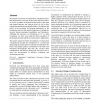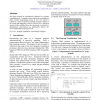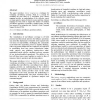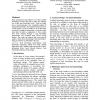101
click to vote
APVIS
2003
15 years 3 months ago
2003
© We present a taxonomy for Information Visualization (IV) that characterizes it in terms of data, task, skill and context, as well as a number of dimensions that relate to the in...
110
click to vote
APVIS
2003
15 years 3 months ago
2003
UML class diagrams of complex software systems are frequently very large, making it difficult to gain a detailed understanding of the underlying software components within the con...
APVIS
2003
15 years 3 months ago
2003
150
click to vote
APVIS
2003
15 years 3 months ago
2003
This paper presents an experimental evaluation of a program visualisation tool. Computer science students in an introductory object oriented programming course in Java were asked ...
APVIS
2003
15 years 3 months ago
2003
This paper introduces latency mapping as a technique for visualising surveillance coverage. Built on a concept for modelling the total effort by a surveillance force, latency mapp...
110
click to vote
APVIS
2003
15 years 3 months ago
2003
In this paper techniques from multidimensional scaling and graph drawing are coupled to provide an overview-and-detail style method for visualising a high dimensional dataset whos...
112
click to vote
APVIS
2003
15 years 3 months ago
2003
High cohesion, or module strength, indicates that a system has been well partitioned into components which have strong internal relationships. An understanding of cohesion is an i...
111
click to vote
APVIS
2003
15 years 3 months ago
2003
Existing large scale display systems generally adopt an indirect approach to user interaction. This is due to the use of standard desktop-oriented devices, such as a mouse on a de...
APVIS
2003
15 years 3 months ago
2003
Many organisations make effective use of their codified knowledge, but they often fail to make most efficient use of their tacit knowledge stocks. What we define here as tacit kno...




